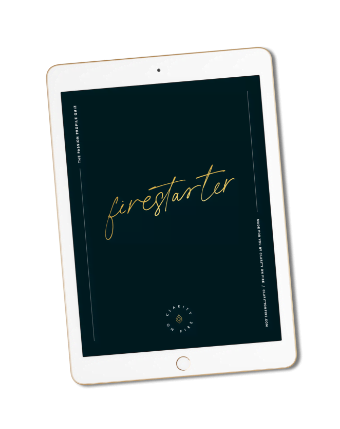Ever seen, or even been, someone who has a constant negative feedback loop when it comes to their financial situation? It usually looks something like this: Person works 9-5 (at least) at a “meh” kind of job, with a “meh” kind of paycheck. Every once in a while, some unexpected expense pops up and they grumble about doling out money for it. They’re probably constantly complaining, and constantly worried, about not having “enough.” Their self-talk sounds a lot like, “Earning enough means hard work,” and “You shouldn’t take risks,” and “Money isn’t easy to come by.”
To them, money is just “the way it is,” and they don’t try, and probably don’t even realize, that they could do anything to change their lot in life. In fact, they often cling to their limited perspective, simply because it’s safe and they feel validated when they see the world proving itself, over and over again, to be exactly what they believe it to be (i.e. limited, difficult, never enough).
Ugh. That’s so exhausting, so tired, and so … not the way it has to be.
Cheryl Richardson, famous life coach, author, speaker, and all-around awesome human being once said: “Financial abundance flows when you trust yourself enough to handle it.” Does that stop you in your tracks a little bit? It did when I first heard it.
If you read into that a little more, you’ll discover that what Cheryl’s saying, basically, is “Guess what? You don’t really get to blame the world, society, or “the way it is” on your financial situation (or any situation, when it comes down to it). Money is nothing more than energy that we use as a stand-in for trading value with each other. If you’re not receiving enough value for what you think you’re contributing, that’s not the fault of the world. It’s not permanent, either. You can fix it. You just need to take responsibility for it.”
For the chronic financial complainer, worrier, or “never enough-er,” taking responsibility means asking yourself, “Why don’t I trust myself with more than I currently have? And what’s keeping me repeating the same pattern that gets me nowhere?”
Building self-trust with money is a lot easier than you would think, too. It can be as simple as checking your bank balance every day, examining what you’re really spending money on every month, making cuts to items on your budget that don’t make you feel good, or making a solid plan to get yourself out of debt. Kate Northrup’s Money, A Love Story (which we’ve recommend before) is one of the best resources for changing your relationship with money, in general.
The bottom line: Your financial situation, and everyone else’s, is chock full of emotion. How you feel about money, including how much you trust yourself with it, can either enable more to flow in, or completely block you from ever getting out of the same old rut. Either way, the responsibility is 100% yours, which should ultimately feel like a relief: “Hey, good news! The world isn’t actually conspiring to keep me poor. It’s me!”
So … what are you going to change to build your own self-trust? We’d love to know.
Much Love,
Kristen & Rachel



This really is so true. First you have to want it (duh, doesn’t everyone?). Then, you have to realize why you don’t have it? You make your own fortune. You’re working hard, and not getting what you desire – why?
It’s taken me ’til the ripe old age of 29 and a half (holding onto the half, ladies), to be able to stop the patterns of what was TRULY holding me back and create new patterns to put me on the path to make me happy. It isn’t easy but really, baby steps.
quite inspiring, thank you